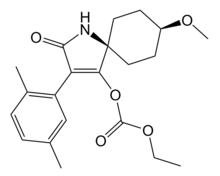Spirotetramat
Spirotetramat (ISO Name) is a keto-enol insecticide developed by Bayer CropScience under the brand names Movento[2] and Ultor.[3]
 | |
| Names | |
|---|---|
| IUPAC name
cis-3-(2,5-Xylyl)-4-(ethoxycarbonyloxy)-8-methoxy-1-azaspiro[4.5]dec-3-en-2-one | |
| Other names
Spirotetramat, Movento, Ultor, cis-3-(2,5-dimethylphenyl)-8-methoxy-2-oxo-1-azaspiro[4.5]dec-3-en-4-yl ethyl carbonate | |
| Identifiers | |
3D model (JSmol) |
|
| ECHA InfoCard | 100.106.958 |
| EC Number |
|
PubChem CID |
|
| UNII | |
CompTox Dashboard (EPA) |
|
| |
| |
| Properties | |
| C21H27NO5 | |
| Molar mass | 373.449 g·mol−1 |
| Density | 1.23 g/cm3 |
| Melting point | 142 °C (288 °F; 415 K) |
| Boiling point | 235 °C (455 °F; 508 K) (decomposes) |
| Practically insoluble (0.03 g/L at 20 °C and pH 7) | |
| Solubility in dichloromethane | Easily soluble |
| Acidity (pKa) | 6.9[1] |
| Hazards | |
| Main hazards | Irritant |
| GHS Signal word | Warning |
GHS hazard statements |
H317, H319, H335, H361, H400, H410 |
| P201, P202, P261, P264, P271, P272, P273, P280, P281, P302+352, P304+340, P305+351+338, P308+313, P312, P321, P333+313, P337+313, P363, P391, P403+233, P405, P501 | |
| Flash point | Non-flammable |
Except where otherwise noted, data are given for materials in their standard state (at 25 °C [77 °F], 100 kPa). | |
| Infobox references | |
Mechanism
Spirotetramat is active against piercing-sucking insects, such as aphids, mites, and white flies, by acting as an ACC inhibitor, interrupting lipid biosynthesis in the insects. It is a systemic insecticide that penetrates plant leaves when sprayed on. It is ambimobile, being transported both upwards and downwards through vascular bundles.[4] In plants, it is hydrolyzed to the enol form by cleavage of the central ethoxycarbonyl group. This enol is more stable due to double bond being in a ring and the conjugation with the amide group and the benzene ring.
Regulation
Bayer obtained spirotetramat's first regulatory approval in Tunisia in 2007.[5][6] It was recognized by the European Union May 1, 2014.[7]
Toxicology and safety
Spirotetramat has moderate to low acute toxicity, is irritating to eyes and potentially sensitizing to skin. When tested on rats, it was not shown to be carcinogenic.[8] In Denmark, it is listed as harmful to aquatic invertebrates, but not dangerous to bees.[9]
References
- "Biological Buffers". Sigma-Aldrich.
- "Movento". Crop Science.
- "US EPA, Pesticide Produce Label, ULTOR, 05/06/2011" (PDF). EPA.
- Bruck E, et al. (Oct 2009). "Movento, an innovative ambimobile insecticide for sucking insect pest control in agriculture: Biological profile and field performance". Crop Protection. 28 (10): 838–844. doi:10.1016/j.cropro.2009.06.015.
- Braham M, Glida-Gnidez H, Hajji L (7 Aug 2012). "Management of the tomato borer, Tuta absoluta in Tunisia with novel insecticides and plant extracts". EPPO Bulletin. 42 (2): 291–296. doi:10.1111/epp.2572.
- Agropages: New insecticide spirotetramat granted first regulatory approval." (15 november 2007)
- COMMISSION IMPLEMENTING REGULATION (EU) No 1177/2013. (23 January 2018)
- "EPA Pesticide Fact Sheet, juni 2008" (PDF).
- "Merit Gran - Produktoplysninger - Middeldatabasen". middeldatabasen.dk.